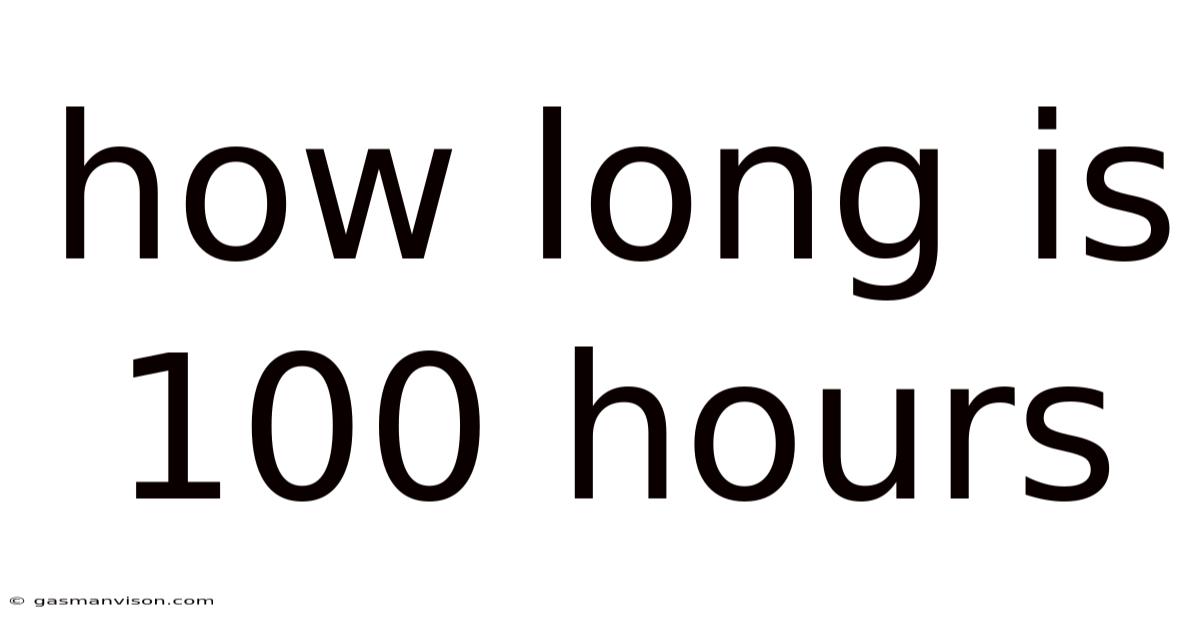How Long Is 100 Hours
gasmanvison
Sep 13, 2025 · 4 min read

Table of Contents
How Long Is 100 Hours? A Comprehensive Guide to Understanding Time
How long is 100 hours? It's a deceptively simple question with a surprisingly complex answer. While the mathematical answer is straightforward – 100 hours is exactly 100 hours – understanding its real-world implications requires a deeper dive into how we perceive and experience time. This article explores the length of 100 hours from various perspectives, offering practical examples and helping you grasp its true magnitude.
Understanding the Magnitude of 100 Hours
To fully appreciate the length of 100 hours, let's break it down into more relatable units:
-
Days: 100 hours equals 4 days and 4 hours. This immediately offers a clearer picture, allowing us to visualize a period stretching across almost a full work week.
-
Weeks: 100 hours is approximately 1.43 weeks, or just over one full week.
-
Months: Approximately 4.17 days of a 24-hour day month.
This breakdown allows for better context. Instead of an abstract number, we now have a timeframe we can relate to our daily routines and schedules. However, the perceived length of 100 hours can significantly vary depending on several factors.
Factors Influencing the Perception of 100 Hours
The subjective experience of time is a fascinating phenomenon. 100 hours can feel like a blink of an eye or an eternity, depending on several crucial factors:
-
Activity Level: 100 hours spent engrossed in an exciting activity, like a thrilling video game marathon or a captivating book, will likely feel shorter than the same amount of time spent performing monotonous tasks. Our brains tend to compress time when we are actively engaged and stimulated.
-
Emotional State: Positive emotions can make time fly, while negative emotions, like boredom or anxiety, can make time crawl. A period filled with joy and excitement will feel significantly shorter than a similar period filled with stress and frustration.
-
Age: As we age, our perception of time changes. Time seems to accelerate as we get older, meaning that 100 hours might feel shorter to an older person than to a younger one. This is a complex phenomenon with various contributing factors.
-
Mental State: A period of intense focus or concentration can make time seem to pass quickly. Conversely, periods of mental fatigue or distraction can stretch the experience of time. This includes the impact of sleep deprivation; 100 hours of continuous activity will obviously feel much longer than if those 100 hours are interspersed with adequate sleep.
Real-World Examples of 100 Hours
Let's explore some real-world examples to further illustrate the length of 100 hours:
-
Work: A standard 40-hour workweek leaves 60 hours unaccounted for. This represents a significant portion of your personal time.
-
Travel: A long road trip or a multi-city adventure could easily consume 100 hours.
-
Projects: Many large-scale projects, ranging from writing a book to renovating a home, could take 100 hours or more to complete.
-
Hobbies: Dedicated hobbyists could easily spend 100 hours working on a complex project, be it knitting, painting, coding, or playing a musical instrument.
These examples highlight the diverse contexts in which 100 hours can be experienced. The duration isn't merely a numerical value; it's a significant portion of time capable of encompassing a wide array of activities and experiences.
Practical Applications of Understanding 100 Hours
Understanding the magnitude of 100 hours has practical applications in various aspects of life:
-
Project Management: Accurately estimating project durations is critical. Breaking down large projects into smaller, manageable tasks helps in better time management and realistic deadlines.
-
Personal Time Management: Allocating time effectively for personal projects, hobbies, or relaxation requires understanding how much time is available.
-
Travel Planning: Knowing how many hours are needed for a trip helps in logistical planning, including travel time, accommodation, and activities.
-
Goal Setting: Establishing realistic timelines for achieving goals depends on accurate assessment of the time required.
Comparing 100 Hours to Other Time Frames
To further contextualize 100 hours, let's compare it to other commonly used time frames:
-
A year: 100 hours represents less than 1.15% of a 365-day year (8760 hours).
-
A month (assuming 30 days): 100 hours equates to approximately 4.17 days of a 30-day month.
-
A week: It's approximately 1.43 weeks.
These comparisons provide a broader perspective on the relative length of 100 hours within the larger context of time. It's a considerable chunk of time, but relatively small in the grand scheme of things.
Conclusion: The Multifaceted Nature of Time
The question "How long is 100 hours?" doesn't have a single definitive answer. While mathematically it's 4 days and 4 hours, the subjective experience of those 100 hours varies greatly based on individual circumstances. Understanding the factors influencing time perception allows for a more nuanced and practical understanding of how time works in our daily lives. Ultimately, 100 hours is a substantial amount of time, offering ample opportunity for accomplishment, adventure, or simply relaxation, depending on how it's used. Effective time management and a conscious awareness of our personal relationship with time are key to maximizing its value. The key takeaway is not just the mathematical value, but the potential within those 100 hours. How you choose to spend them is entirely up to you.
Latest Posts
Latest Posts
-
3 Parts Of A Nucleotide
Sep 13, 2025
-
When An Incident Expands
Sep 13, 2025
-
Electron Dot Diagram For Nitrogen
Sep 13, 2025
-
Is Magnesium 24 An Isotope
Sep 13, 2025
-
Science What Is A Producer
Sep 13, 2025
Related Post
Thank you for visiting our website which covers about How Long Is 100 Hours . We hope the information provided has been useful to you. Feel free to contact us if you have any questions or need further assistance. See you next time and don't miss to bookmark.